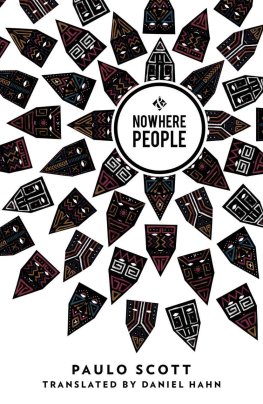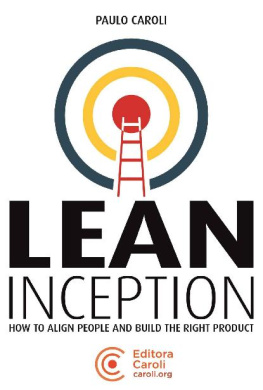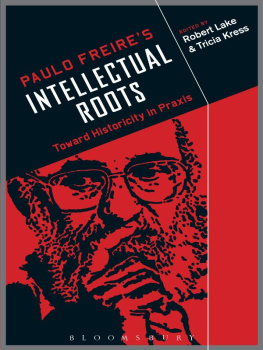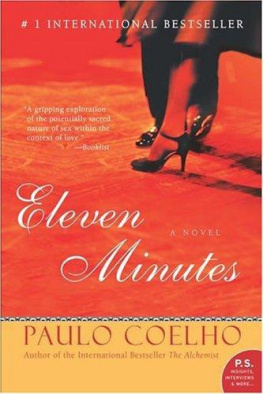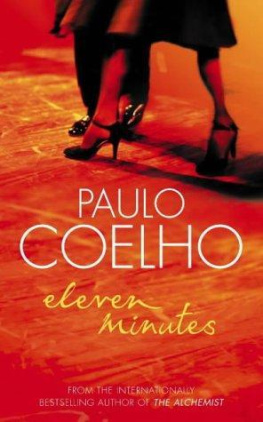Paulo Scott - Nowhere People
Here you can read online Paulo Scott - Nowhere People full text of the book (entire story) in english for free. Download pdf and epub, get meaning, cover and reviews about this ebook. year: 2014, publisher: And Other Stories Publishing, genre: Prose. Description of the work, (preface) as well as reviews are available. Best literature library LitArk.com created for fans of good reading and offers a wide selection of genres:
Romance novel
Science fiction
Adventure
Detective
Science
History
Home and family
Prose
Art
Politics
Computer
Non-fiction
Religion
Business
Children
Humor
Choose a favorite category and find really read worthwhile books. Enjoy immersion in the world of imagination, feel the emotions of the characters or learn something new for yourself, make an fascinating discovery.
- Book:Nowhere People
- Author:
- Publisher:And Other Stories Publishing
- Genre:
- Year:2014
- Rating:5 / 5
- Favourites:Add to favourites
- Your mark:
- 100
- 1
- 2
- 3
- 4
- 5
Nowhere People: summary, description and annotation
We offer to read an annotation, description, summary or preface (depends on what the author of the book "Nowhere People" wrote himself). If you haven't found the necessary information about the book — write in the comments, we will try to find it.
Nowhere People — read online for free the complete book (whole text) full work
Below is the text of the book, divided by pages. System saving the place of the last page read, allows you to conveniently read the book "Nowhere People" online for free, without having to search again every time where you left off. Put a bookmark, and you can go to the page where you finished reading at any time.
Font size:
Interval:
Bookmark:
Paulo Scott
Nowhere People
For Simone da Costa Carvalho
whatever happens theres always something left over to happen again nineteen eighty-nine
If hed had to summarise his days as a political militant, Paulo would have said that he went from total idealism to unparalleled cynicism, then finally to the melancholy escapism of these last months. Thats not how it should have been, just when the Workers Party won the Town Hall elections in Porto Alegre and he became known up and down the country as a student leader, a key figure with a good chance to try for a seat on the City Council three years from now, and only twenty-one years old, about to graduate in law at the end of the year from the Federal University of Rio Grande do Sul, and for whom it took the whole of last year to realise this fact: that despite his great potential, he is no more than a minor foot-soldier, a pawn among the other pieces on the board, not greedy enough to challenge, equal to equal, the schemings of the gang on the second echelon, many of them creeps he had already hated even before he joined, back in eighty-four. His current difficulty in getting more deeply involved in political life, in making a career of it and fighting for it, would only end up in physical dependency, and its price already seems to him to be too high; and he knows that if he does not push himself forward and just allows himself to be carried along by the partys almost inevitable ascent he runs the risk of one day having to cling shamefully to the coat-tails of one of the creeps he so despises in order to get himself a place in the administrative machine and support himself financially. Just as hundreds of his fellow activists are doing, throwing themselves into the contest in the pursuit of positions in the state administrative departments, in the mayors office, the deputy mayors office, in foundations, public institutions and joint public-private enterprise; people who until recently, especially over a beer, would insist on beating their chests and declaring they were only there to rescue Brazil from exploitation by capital. In a way, he can understand: he is asking too much of himself and is unable to face up to the days that have finally arrived with any sense of calm, these days towards which his physical, mental and emotional energies have been channelled over the past four years. What is certain is that since the beginning, when he took part in that first local party meeting in Glria in eighty-three, he had promised himself he would not allow his theoretical unpreparedness and almost complete innocence in relation to politics to be transformed into mediocrity. Already he cant help seeing most of the leadership as members of a Machiavellian and tightly-knit little fraternity of opportunists carrying forward their own plans in order to attain power and, consequently, some money as quickly as possible. He has lost his capacity to assimilate contradictions. He has stopped believing. Which is why his focus on what needed to be done and the resulting calm of belief have disappeared. This anxiety remains. Less than a month ago at a consultation with Doctor Geraldo, who has been looking after his family for three generations, he heard: Paulo, this stress of yours is manifesting too severely in physical symptoms; its all going to your stomach. Its not normal for a big lad of your age to have chronic gastritis as advanced as yours. The doctor spoke with his measured border accent and looked at Paulo until he said yes, I know, doctor, Ill try and take care of myself. He left the surgery with a prescription for an acid blocker even stronger than the Cimetidina he was already taking and an absolute ban on consuming any kind of alcoholic drink or spicy food for a fortnight, at least. He doesnt feel comfortable. And even having decided to cut himself off from the party completely, Paulo still has not cancelled his membership and remains bound to the Trotskyite-based organisation with which he has been involved for three years, and last Saturday (despite being deliberately late and missing the ten-thirty bus that had left Porto Alegre the previous night for the city of Rio Grande, carrying another fifteen militants who were taking part in the years first clandestine meeting of his organisation), he woke up before six, washed his face, packed his law-trainee rucksack with three changes of clothes and left the house in his Durepox-grey Beetle, an eighty-three model, to pull in half an hour later at pump number four at the Ipiranga petrol station on the corner of Santo Antnio and Voluntrios da Ptria and ask the attendant to put in thirty litres of petrol which he would split with his two acquaintances from So Loureno do Sul, Eduardo Blondie Vanusa and Handlebar Tache Nico, dressed up as the Beagle Boys, slumped in the passenger seat and the back seat respectively (and still drunk from the rounds of beer with Steinhger theyd consumed at Bar Lola while they waited for a certain Neide from the Porto de Elis Cocktail Bar who was going to show up dressed as Dr Frank-N-Furter, the cross-dressing Transylvanian from The Rocky Horror Show to get them into the invitation-only fancy dress party taking place in the Bar Ocidente; Neide, as it turned out, never showed up), and at quarter to seven cross the Guaba drawbridge and head towards the south of the state for what might be his last meeting as a member of the organisation, driving without worrying about his passengers, who had already given up and were drooling into the upholstery of the seats; driving without having to put up with three hundred kilometres worth of feeble talk about revolution and the Fourth International, about which of the Workers Party girls theyd had and, with the help of the most preposterous Reichian arguments, about the ones who might have started off stubborn but were now desperate to give up their pussies. Saturday passed slowly. He struggled to stay awake during the debates; he couldnt bear to look at those people any longer. It was not a coincidence that at night, as soon as the last panel discussion came to an end, he slipped away, got his car, went to Cassino Beach. There he came across the birthday party in the ballroom of the Hotel Atlntico where he happened to run into Manoela, a producer two years older than him, with whom he had fallen in love at the end of a summer on the Ilha do Mel three years back. She was the one who spotted him and came over delightedly and after the requisite where have you been what have you been up to how have we left it so long, and as soon as he said hed driven down from Porto Alegre, told him she was working as a theatre producer and was currently touring with a group who were due to be on stage at the Sete de Abril Theatre in Pelotas on Sunday and she needed someone reliable to take the costumes for the play back to Novo Hamburgo, where they were based, bemoaning the fact that the original budget was inadequate and that no delivery company would do it quickly enough without charging an arm and a leg and, not letting him respond, said she would give him seven thousand cruzados if he would drop the clothes off at her assistants house to be washed and mended in time for Fridays performance at the University of Vale do Rio dos Sinos; she said that she and the actors would be staying in Pelotas till Thursday night to see to certain commitments they were obliged to honour for the local town hall, and no sooner had she asked would you help me out on this one? than he accepted. It was then that, skilfully, she adjusted the details: the clothes would actually only be ready for him on Tuesday, late in the morning on Tuesday, as there was a workshop, and he knows what theyre like, these things to do with didactic stimulation and learning strategies and all that. Paulo felt like hed been duped. On Monday afternoon he had to be at the law firm where he was doing an internship. He considered for a few moments theres nothing that needs doing that cant wait till Wednesday (hell phone to let them know that hell only come in to work on Wednesday). He let Manoela keep talking until he interrupted. I dont have anywhere to stay Sunday night or Monday night. She smiled (smiling is part of the process by which she senses an opportunity appearing). Were in the best hotel in Pelotas, she said snobbishly. Space wont be a problem. The lighting guys room was vacated yesterday, the nights have already been paid for, its all settled. You neednt worry, you can take his place and Ive got to say, youre in luck: the son of a bitch bagged himself the best room of all. The truth was, he loved watching her in action, doing whatever she wanted to make her plans happen right away, even when he was the victim. They exchanged small talk, they joined the people shaking frantically on the dance floor. He considered making a move on her, putting his arms round her waist, pushing things a bit just to see where it might go, but there was no point. Manoela had always been out of his league, she always would be. And as a song came to an end, in a blas tone of voice that made him feel confusingly mature, rather like Manoela herself, he said Im going to go for that walk now, Manu, she stroked his face affectionately, and each went their own way. He got a beer from the pantry, struck up a conversation with a girl who looked just like the actress Malu Mader and who seemed to have had too much to drink. This pretend Malu, who was really Ana Cristina something-or-other, said some nonsense that really annoyed him; all the same they walked together to a party that was happening two blocks from the hotel and where to his misfortune they were only serving a sweet red wine. He lied about having already graduated and said that he was travelling to Cuba in a few weeks and then to Spain and Portugal to do a masters in comparative law at Coimbra. Lying, lying out of spite, was what the situation called for, it was the only way to be affectionate, responsive. Even though she was pretty out of it, she said that she so loved his
Font size:
Interval:
Bookmark:
Similar books «Nowhere People»
Look at similar books to Nowhere People. We have selected literature similar in name and meaning in the hope of providing readers with more options to find new, interesting, not yet read works.
Discussion, reviews of the book Nowhere People and just readers' own opinions. Leave your comments, write what you think about the work, its meaning or the main characters. Specify what exactly you liked and what you didn't like, and why you think so.

